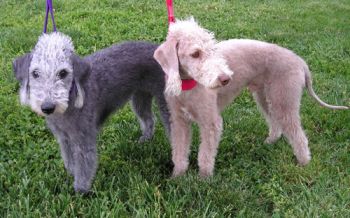
Bedlington Terrier
Veterinarian Reviewed on December 22, 2007 by Dr. Janice Huntingford
Physical Characteristics
Breed Group:
Terrier group.
Weight:
17-23 pounds (7.5-10.5 kilograms).
Height:
15-17 inches at the shoulders.
Color(s):
Standard colors include blue, sandy, and liver with tan markings.
Coat:
These dogs have a woolly, somewhat curly coat that blends soft and hard hairs.
Overview
Character:
Bedlington Terriers are gentle dogs that will do almost anything that is asked of them. These terriers make great companions, especially for children.
Country of Origin:
England.
History:
The exact origin of this breed remains unknown; however, these dogs became popular in Northumberland, England during the nineteenth century when they were used by miners to clear rats out of tunnels.
Name:
Named for the town of Bedlington, Northumberland, England. Additional names include Rothbury Terrier, Rodbery Terrier, Gypsy Dog.
Temperament:
These terriers are intelligent but can also be stubborn. However, this breed is generally quite obedient and more gentle than other terriers.
Care
Training:
Bedlington Terriers are intelligent dogs and are willing to perform almost any task asked of them.
Activity:
These dogs are very active and like to run. They require daily vigorous exercise and play sessions.
Ownership:
While these dogs don’t shed and are non-allergenic, they do require regular brushing and professional grooming three or four times a year. They also require a high level of exercise and activity. Bedlington Terriers are great with children and make good watchdogs but poor guard dogs.
Breeders
No breeders listed at this time.
Sign up for our newsletter and receive more articles and the latest pet health updates and special offers.
Our Expert
 Dr. Janice Huntingford
Dr. Janice HuntingfordJanice Huntingford, DVM, has been in veterinary practice for over 30 years and has founded two veterinary clinics since receiving her Doctor of Veterinary Medicine at the Ontario Veterinary College, University of Guelph. She has studied extensively in both conventional and holistic modalities. Ask Dr. Jan

